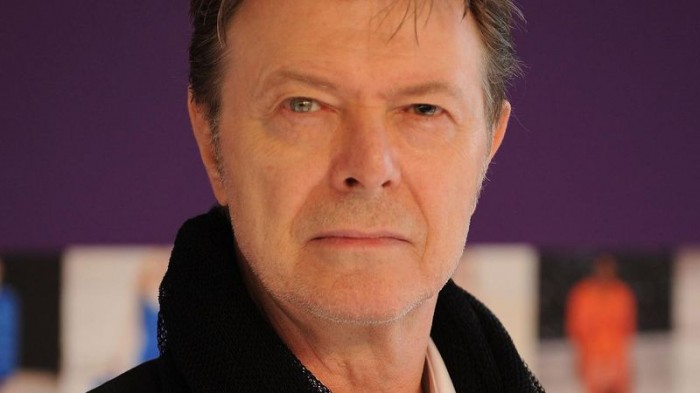
“David Bowie died peacefully today surrounded by his family after a courageous 18 month battle with cancer. While many of you will share in this loss, we ask that you respect the family’s privacy during their time of grief,” read a statement posted on the artist’s official social media accounts.
The influential singer-songwriter and producer dabbled in glam rock, art rock, soul, hard rock, dance pop, punk and electronica during his eclectic 40-plus-year career.
Bowie’s artistic breakthrough came with 1972’s The Rise and Fall of Ziggy Stardust and the Spiders From Mars, an album that fostered the notion of rock star as space alien. Fusing British mod with Japanese kabuki styles and rock with theater, Bowie created the flamboyant, androgynous alter ego Ziggy Stardust.
Three years later, Bowie achieved his first major American crossover success with the No. 1 single “Fame” off the top 10 album Young Americans, then followed with the 1976 avant-garde art rock LP Station to Station, which made it to No. 3 on the charts and featured top 10 hit “Golden Years.”
Other memorable songs included 1983’s “Let’s Dance” — his only other No. 1 U.S. hit — “Space Oddity,” “Heroes,” “Changes,” “Under Pressure,” “China Girl,” “Modern Love,” “Rebel, Rebel,” “All the Young Dudes,” “Panic in Detroit,” “Fashion,” “Life on Mars,” “Suffragette City” and a 1977 Christmas medley with Bing Crosby.
See More: Hollywood’s Notable Deaths of 2015
With his different-colored eyes (the result of a schoolyard fight) and needlelike frame, Bowie was a natural to segue from music into curious movie roles, and he starred as an alien seeking help for his dying planet in Nicolas Roeg’s surreal The Man Who Fell to Earth (1976). Critics later applauded his three-month Broadway stint as the misshapen lead in 1980’s The Elephant Man.
Bowie also starred in Marlene Dietrich’s last film, Just a Gigolo (1978), portrayed a World War II prisoner of war in Merry Christmas Mr. Lawrence (1983), and played Pontius Pilate in Martin Scorsese’s The Last Temptation of Christ (1988). And in another groundbreaking move, Bowie, who always embraced technology, became the first rock star to morph into an Internet Service Provider with the launch in September 1998 of BowieNet.
Born David Jones in London on Jan. 8, 1947, Bowie changed his name in 1966 after The Monkees’ Davy Jones achieved stardom. He played saxophone and started a mime company, and after stints in several bands he signed with Mercury Records, which in 1969 released his album Man of Words, Man of Music, which featured “Space Oddity,” a poignant song about an astronaut, Major Tom, spiraling out of control.
In an attempt to stir interest in Ziggy Stardust, Bowie revealed in a January 1972 magazine interview that he was gay — though that might have been a publicity stunt — dyed his hair orange and began wearing women’s garb. The album became a sensation.
Wrote rock critic Robert Christgau: “This is audacious stuff right down to the stubborn wispiness of its sound, and Bowie’s actorly intonations add humor and shades of meaning to the words, which are often witty and rarely precious, offering an unusually candid and detailed vantage on the rock star’s world.”
Bowie changed gears in 1975. Becoming obsessed with the dance/funk sounds of Philadelphia, his self-proclaimed “plastic soul”-infused Young Americans peaked at No. 9 with the single “Fame,” which he co-wrote with John Lennon and guitarist Carlos Alomar.
After the soulful but colder Station to Station, Bowie again confounded expectations after settling in Germany by recording the atmospheric 1977 album Low, the first of his “Berlin Trilogy” collaborations with keyboardist Brian Eno.
In 1980, Bowie brought out Scary Monsters, which cast a nod to the Major Tom character from “Space Oddity” with the sequel “Ashes to Ashes.” He followed with Tonight in 1984 and Never Let Me Down in 1987 and collaborations with Queen, Mick Jagger, Tina Turner, The Pat Metheny Group and others. He formed the quartet Tin Machine (his brother Tony played drums), but the band didn’t garner much critical acclaim or commercial gain with two albums.
Bowie returned to a solo career with 1993’s Black Tie White Noise, which saw him return to work with his Spider From Mars guitarist Mick Ronson, then recorded 1995’s Outside with Eno and toured with Nine Inch Nails as his opening act. He returned to the studio in 1996 to record the techno-influenced Earthling. Two more albums, 1999’s hours … and 2002’s Heathen, followed.
Bowie also produced albums for, among others, Lou Reed, The Stooges and Moot the Hoople, for which he wrote the song “All the Young Dudes.” He earned a lifetime achievement Grammy Award in 2006.
Bowie also produced albums for, among others, Lou Reed, The Stooges and Moot the Hoople, for which he wrote the song “All the Young Dudes.” He earned a lifetime achievement Grammy Award in 2006.
